Public health for cats and dogs in Brazil
São Paulo’s four municipal veterinary hospitals care for thousands of pets in an initiative shared by other Latin American cities, but that does not exist in Europe
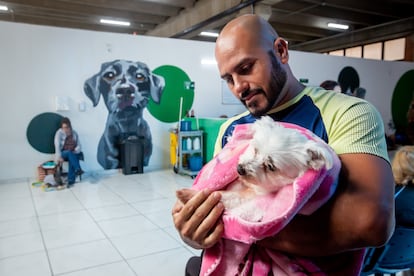

Charlie, a gorgeous golden-haired labrador, dozes on a blanket in a waiting room in São Paulo, among dozens of other dogs and cats. He has never been this sick. First it was the rash on his mouth. The veterinarian suspected lupus and recommended a biopsy. 31-year-old Kelly Queiroz paid for her pet’s appointment with a private doctor, but the test was impossible for her: “It was 200 reales,” she says, a cost of $40. It cost too much. So the Brazilian decided to wait and see if the dog got better. He got worse. “He stopped eating, his feet got swollen,” Queiroz recalls. She paid for pet insurance, but it turned out that it initially only covered emergencies. Charlie was sick, but it wasn’t that serious. A coworker at the museum where Queiroz works told her about this free public veterinary hospital. She was surprised and relieved.
Now, here she is, lined up for Charlie to get an ultrasound and an IV at the North Municipal Veterinary Hospital of São Paulo. The dog just had his blood drawn, and he has an appointment with the dermatologist, but he still does not have a clear diagnosis. “Just knowing it’s not serious, I’m relieved. And the calm of getting treatment without having to juggle the impossible payments. Doctor Giulia has attended us wonderfully. I even cried,” Queiroz said last Wednesday. Ten hours prior, at midnight, she lined up with Charlie and a blanket. The demand is enormous, so receiving care requires patience, which dissuades those who can afford private treatment.
Low-income neighbors, those who cannot pay for a clinic in Latin America’s wealthiest and most populous city, are the priority users of the four veterinary hospitals in São Paulo, a city with 12 million people, 1.9 million dogs and more than 800,000 cats, numbers that will only increase in the census soon to be released.
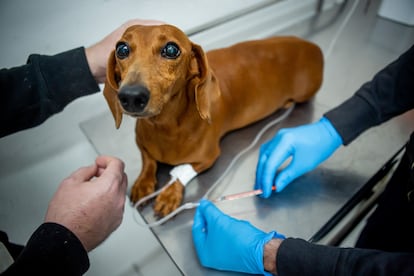
It is a free public service with an impressive range of specialities, from ophthalmology to orthopedics, dentistry and oncology. In these halls, a dog with an amputated paw crosses paths with one with diabetes, a cat in cancer treatment and an army of uniformed young veterinarians and nurses with colorful bandannas. The premises are sober and bare-bones, but with an intensive care unit and three operating rooms.
Doctor Daniel Leite da Silva directs the metropolis’s network of veterinary hospitals. Why did the city decide to spend public money on this? Because, he explains, it creates a virtuous cycle for the pets and their companions: “We prevent animals from being abandoned. It allows us to maintain epidemiological monitoring to prevent zoonosis —illnesses that are passed from animals to humans— and we help to care for the emotional health of the tutors who take care of their pet’s wellbeing.”
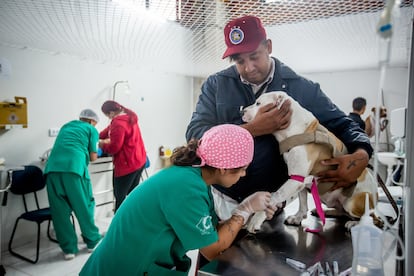
With a team of 145 veterinarians and almost 100 aides, last year, the four hospitals attended 130,000 visits. The budget for this year reaches 27 million reales ($5.3 million).
São Paulo opened its first municipal veterinary hospital in 2012. Its experience has inspired cities like Brasilia, Salvador de Bahía and Guarulhos. Similar centers exist in Mexico and Argentina, and El Salvador just inaugurated one. Brazilian users are surprised to hear that such services do not exist in wealthy Europe. As Micaela de la Maza, creator of srperro.com, a website about dogs, says, “In Europe they don’t exist. At the end of 2022, the first public hospital was announced in Rome. That announcement received a lot of media attention, and the issue has become part of Spanish electoral campaigns.”
In Brazil, as in the rest of the world, pets have gone from being considered property to being seen as family members. Dr. Da Silva notes how that change is reflected even in terminology: “When I started studying, in 2003, we called them owners, then tutors or caretakers, and now some call themselves bichological mothers and fathers [in a play on words on bicho, the Portuguese word for animal].” Like almost all the veterinarians and nurses consulted in the center, he has his own pets: two cats and a dog. His work also encompasses adoption and surgical castration programs. “Here there isn’t indiscriminate euthanasia,” he says.
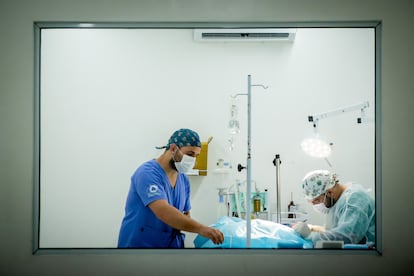
Free veterinary attention can also be understood as a measure to mitigate inequality in Brazil, a country proud of having created the largest human public health system on the planet. Neither the US, China nor India have anything like it. But the disparity between rich and poor is abysmal, and pets also experience the gap.
São Paulo is a city where dozens of thousands of people live in the streets, while powerful executives avoid traffic jams by traveling in air taxis. The megalopolis’s homeless people can take their dogs to the free veterinarian thanks to public services, while the most wealthy, when they go on vacation, leave their dogs in five-star hotels with pools and saunas. The city is dotted with gigantic 24-hour stores that sell everything imaginable to feed and care for an animal. Doggy day cares feature cameras that allow owners to monitor their furry friends from the gym or work. Walking dogs in a baby carriage, or leaving them in hands of a dog walker, is common in privileged neighborhoods.
In the hospital’s waiting room, no barking is heard. The professionals have carried out operations as serious as spinal fractures, but they usually attend low or medium-complexity cases. They don’t have the latest technologies. As the head veterinarian Da Silva says, comparing his resources with the ones he saw at the veterinary hospital at the University of Florida, “there, the care is for whoever can pay. Here we try to reach the widest population possible.” He does the calculation: “With the cost of a CT scan, we do five x-rays.”
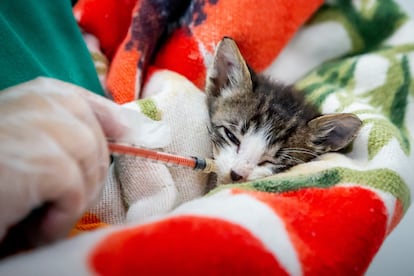
Teo, the cat of Maria Zuleni dos Santos, who works in a bakery, is 11 years old and has intestinal cancer. He awaits the oncologist in his carrier. Zyon is waiting to see the general doctor. “Prince, say something to mommy,” Adriana Costa tells her dog, who stopped eating and drinking last weekend. Costa and her partner came here because a few days of hospitalization cost them almost $100, and each appointment is $40, an impossible rhythm with her salary as a cleaner in a clinic. As she chats, she pays attention to the announcements. When she hears the nurse call, “Zyon and Adriana, you can come back, Zion and Adriana,” she will carry him in her arms to the appointment.
Sign up for our weekly newsletter to get more English-language news coverage from EL PAÍS USA Edition
Tu suscripción se está usando en otro dispositivo
¿Quieres añadir otro usuario a tu suscripción?
Si continúas leyendo en este dispositivo, no se podrá leer en el otro.
FlechaTu suscripción se está usando en otro dispositivo y solo puedes acceder a EL PAÍS desde un dispositivo a la vez.
Si quieres compartir tu cuenta, cambia tu suscripción a la modalidad Premium, así podrás añadir otro usuario. Cada uno accederá con su propia cuenta de email, lo que os permitirá personalizar vuestra experiencia en EL PAÍS.
¿Tienes una suscripción de empresa? Accede aquí para contratar más cuentas.
En el caso de no saber quién está usando tu cuenta, te recomendamos cambiar tu contraseña aquí.
Si decides continuar compartiendo tu cuenta, este mensaje se mostrará en tu dispositivo y en el de la otra persona que está usando tu cuenta de forma indefinida, afectando a tu experiencia de lectura. Puedes consultar aquí los términos y condiciones de la suscripción digital.








































